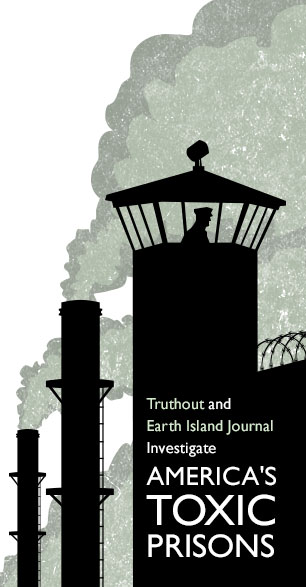Truthout is a vital news source and a living history of political struggle. If you think our work is valuable, support us with a donation of any size.
For many people in the United States, the prison is invisible. How is this possible, given that the US has the highest incarceration rate in the world, with more than 2.3 million people behind bars? The answer is that prison, as an institution, relies on its own invisibility — its ability to disappear human beings.
Prisons are often stowed away in isolated rural areas and small towns. A large number of people in the US — particularly, those who aren’t part of the communities most impacted by incarceration — simply avert their eyes. Activist and scholar Angela Davis explains that prison is viewed as a repository for societal problems, especially those that stem from racism and capitalism. She writes, “The prison has become a black hole into which the detritus of capitalism is deposited.”
In many prisons around the country, the “detritus” is literal. Prisons are sites of some of the worst environmental injustices in this country.
Over the past year, Truthout and Earth Island Journal have undertaken an investigation that documents some of these injustices, underscoring the ways in which the prison-industrial complex devastates communities and the environment, taking serious and sometimes life-threatening tolls on human health.
Articles:
America’s Toxic Prisons: The Environmental Injustices of Mass Incarceration
Thursday, June 1, 2017
By Candice Bernd, Zoe Loftus-Farren and Maureen Nandini Mitra, Truthout, Earth Island Journal | Report
Forced to Endure Extreme Heat, Prisoners Are Casualties of Texas’ Climate Denial, Documents Show
Monday, June 12, 2017
By Candice Bernd, Truthout, Earth Island Journal | Report
DOJ Withdraws Funding Request for Kentucky Prison on Mountaintop-Removal Site
Friday, June 30, 2017
By Zoe Loftus-Farren, Truthout, Earth Island Journal | Report
Climate Refugees in Toxic Immigrant Jails Are Victims of Environmental Racism
Wednesday, July 26, 2017
By Candice Bernd, Truthout, Earth Island Journal | Report
“Cruel and Unusual”: Texas Prisoners Face Deadly Heat and Contaminated Water
Tuesday, August 8, 2017
By Candice Bernd, Truthout, Earth Island Journal | Report
“No Toilet, No Ventilation”: Prisoners Describe Horrific Conditions in Harvey’s Flood Zone
Tuesday, August 8, 2017
By Candice Bernd, Truthout, Earth Island Journal | Report
EPA Adds Prison Locations to Its Environmental Justice Mapping Tool
Thursday, September 21, 2017
By Zoe Loftus-Farren, Truthout, Earth Island Journal | Report
Environmental issues are too often portrayed — by the media, politicians, NGOs and environmentalists themselves — as causes that are separate from the core oppressions embedded in this country’s foundation. Racism, economic injustice, anti-LGBTQ oppression, ableism, sexism and other forces take a backseat in many environmental discussions, if they aren’t completely ignored.
It is impossible to talk about prison, an institution built on slavery, anti-Blackness and anti-Indigenous policies, without confronting these oppressions. It should also be impossible to talk about environmental degradation without addressing oppression and state violence. The rise of the environmental justice movement has given us a framework for understanding the destruction of the environment in the context of the communities it affects most, particularly Black, Brown and poor communities. As Candice Bernd, Zoe Loftus-Farren and Maureen Nandini Mitra show in our investigation, it’s critical that conversations around environmental justice include prisons — both the environmental degradation they cause, and the environment-based health threats to which they expose those trapped inside them.
At least 589 prisons sit within three miles of a Superfund site. Prisons are often located on contaminated sites like landfills and coal ash dumps. Meanwhile, prisons spill contaminated water, including raw sewage, into local waterways, endangering surrounding communities, which are often rural and poor. While prisons themselves are hidden away, their toxicity spreads far beyond their walls.
Our collaborative investigation demonstrates what many incarcerated people have always known: Prisons are toxic.
However, as more people become aware of the links between environmental degradation and incarceration, exciting opportunities emerge for intersectional activism. As Rose Braz and Craig Gilmore note in their discussion of the links between the environmental justice and anti-prison movements, “many of the costs of over-incarceration are hidden, but … they can, once revealed, prove very effective in moving new and formerly unlikely allies into the fight to reduce the numbers of our neighbors locked away.”
Activists are now building brave coalitions to confront the violence being waged against humanity and the planet. Capitalism’s “black holes” are, increasingly, sites of key struggles for justice on all fronts. It’s time for all of us to recognize that prisons are toxic — and that health, life and freedom from toxicity should be human rights for all.
—Maya Schenwar
Editor-in-Chief
Truthout
A terrifying moment. We appeal for your support.
In the last weeks, we have witnessed an authoritarian assault on communities in Minnesota and across the nation.
The need for truthful, grassroots reporting is urgent at this cataclysmic historical moment. Yet, Trump-aligned billionaires and other allies have taken over many legacy media outlets — the culmination of a decades-long campaign to place control of the narrative into the hands of the political right.
We refuse to let Trump’s blatant propaganda machine go unchecked. Untethered to corporate ownership or advertisers, Truthout remains fearless in our reporting and our determination to use journalism as a tool for justice.
But we need your help just to fund our basic expenses. Over 80 percent of Truthout’s funding comes from small individual donations from our community of readers, and over a third of our total budget is supported by recurring monthly donors.
Truthout has launched a fundraiser to add 310 new monthly donors in the next 4 days. Whether you can make a small monthly donation or a larger one-time gift, Truthout only works with your support.
